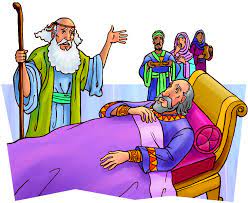Hezekiah’s Illness and Recovery
38: 1-22

In Chapters 36 to 39 Hezekiah is depicted as the representative of the people who discover that God can be trusted. He will keep His promises and He will redeem His people. In that sense these chapters form a theological turning point in the book. Chapters 40 to 66 build on the truth of God’s trustworthiness. But there are still questions to be answered. If Hezekiah is the ideal representative of the trusting people, why the captivity? Or, if God can deliver His people from Assyria, why not Babylon? Or, is Hezekiah the promised child of 7:14 and 9:6-7? Chapters 38 and 39 answer these questions and point beyond Hezekiah to Yeshua Messiah.141
In those days, the events of Chapters 38 and 39 actually occurred before Chapters 36 and 37. The parallel passage for the events in Chapter 38 is in Second Kings 20:1-11 and Second Chronicles 32:24. The Ruach ha-Kodesh, through Isaiah, has chosen not to put this in strictly chronological sequence. But why? The reason is that Chapters 36 and 37 fittingly conclude Chapters 1-35, which have a strong Assyrian orientation. And also, Chapters 38 and 39 form a suitable introduction to Chapters 40-66, which largely describe Judah’s future relationship with the Babylonians. But there is a theological reason as well. Chapters 36 and 37 answer the questions posed in Chapters 7-12. Is God sovereign over all the nations? Can God deliver us from Assyria? And most importantly, can God be trusted? Whereas Chapters 38 and 39 demonstrate that our trust, faith, and belief in ADONAI must be a way of life, not a one-time affair. They reveal that the source of our hope cannot lie in sinful humanity. Like Hezekiah, given that the best of God’s people fail, these remaining chapters point us towards source of our hope . . . Yeshua Messiah.
This chapter, then, is the crisis behind the crisis. It presents Hezekiah in both a positive and negative light. One the one hand, he is still the Hezekiah who can submit to ADONAI and trust Him completely. But on the other hand, he is the Hezekiah who is clearly human. The promises, which were made through Isaiah and recorded in Chapters 7 through 12, had not been fulfilled in him and more revelation would be necessary in order to understand to whom they did refer. This man might be given fifteen years by God’s grace, but he is only a man, not the Messiah.142



Leave A Comment